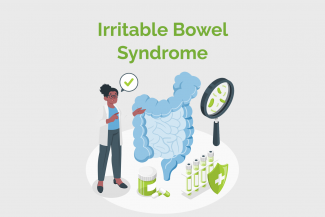
The exact cause of Irritable Bowel Syndrome is yet unknown, but most experts think that it is related to problems with digestion and increased sensitivity of the gut.
- One theory suggests that irritable bowel syndrome is caused by abnormal contractions of the colon and intestines.
- Some people develop irritable bowel syndrome after severe gastrointestinal infection (eg Salmonella or Campylobacter, or viruses). It is not so clear how the infection triggers IBS to develop. However most people with Irritable Bowel Syndrome do not have a history of such infections.
- People with irritable bowel syndrome, who seek medical help are more likely to suffer from anxiety and stress. Although psychological problems such as anxiety does not cause Irritable Bowel Syndrome, but people with IBS may be more sensitive to emotional troubles. Stress and anxiety make the mind more aware of spasms in the colon. IBS may also be triggered by the immune system, which is affected by stress. Stress can cause several hormones such as cortisol to be released that in turn can depress immunity and affect our defense mechanism.
- Food intolerances are common in patients with irritable bowel syndrome raising the possibility of the idea that it is caused by food sensitivity or allergy.
- It is believe that irritable bowel syndrome is caused by heightened sensitivity of the intestines to normal sensations (referred to as "visceral hyperalgesia").
- Irritable bowel syndrome can also have a genetic predisposition. There is more a greater chance of having IBS if a parent or a sibling has it.
Although irritable bowel syndrome is not usually serious, occasionally some complications may arise. If irritable bowel syndrome is causing you to avoid foods which trigger flare-ups, you may be not be getting enough of the key nutrients you need, thus leading to malnourishment.
In addition if you have haemorrhoids, the chronic diarrhea and/or constipation associated with irritable bowel syndrome, can make it worse.
Most imperatively, the condition's impact on quality of life can be the most significant complication. These drawbacks of Irritable bowel syndrome may cause you to feel like you're not living life to the fullest, leading to discouragement or depression.












